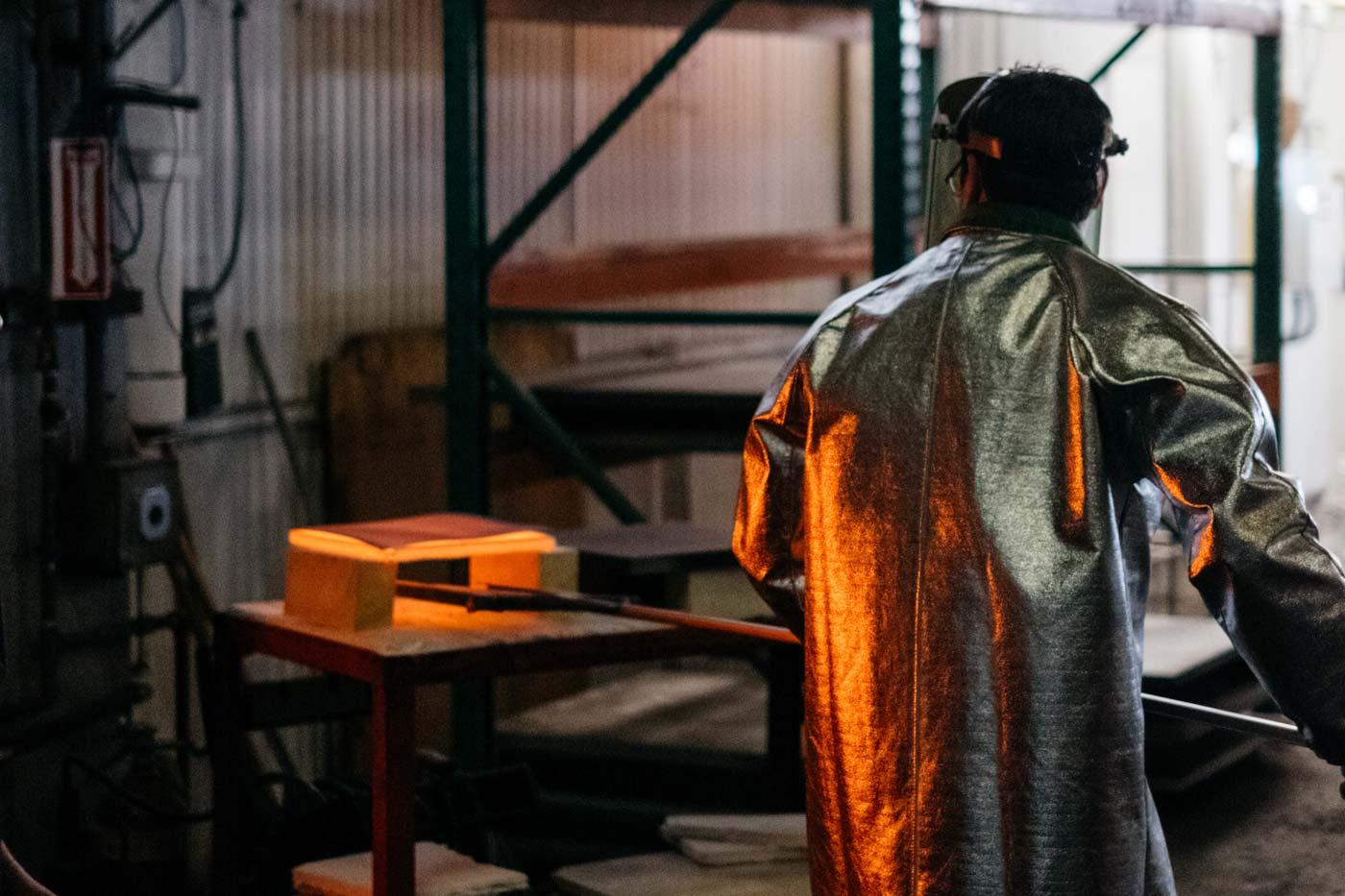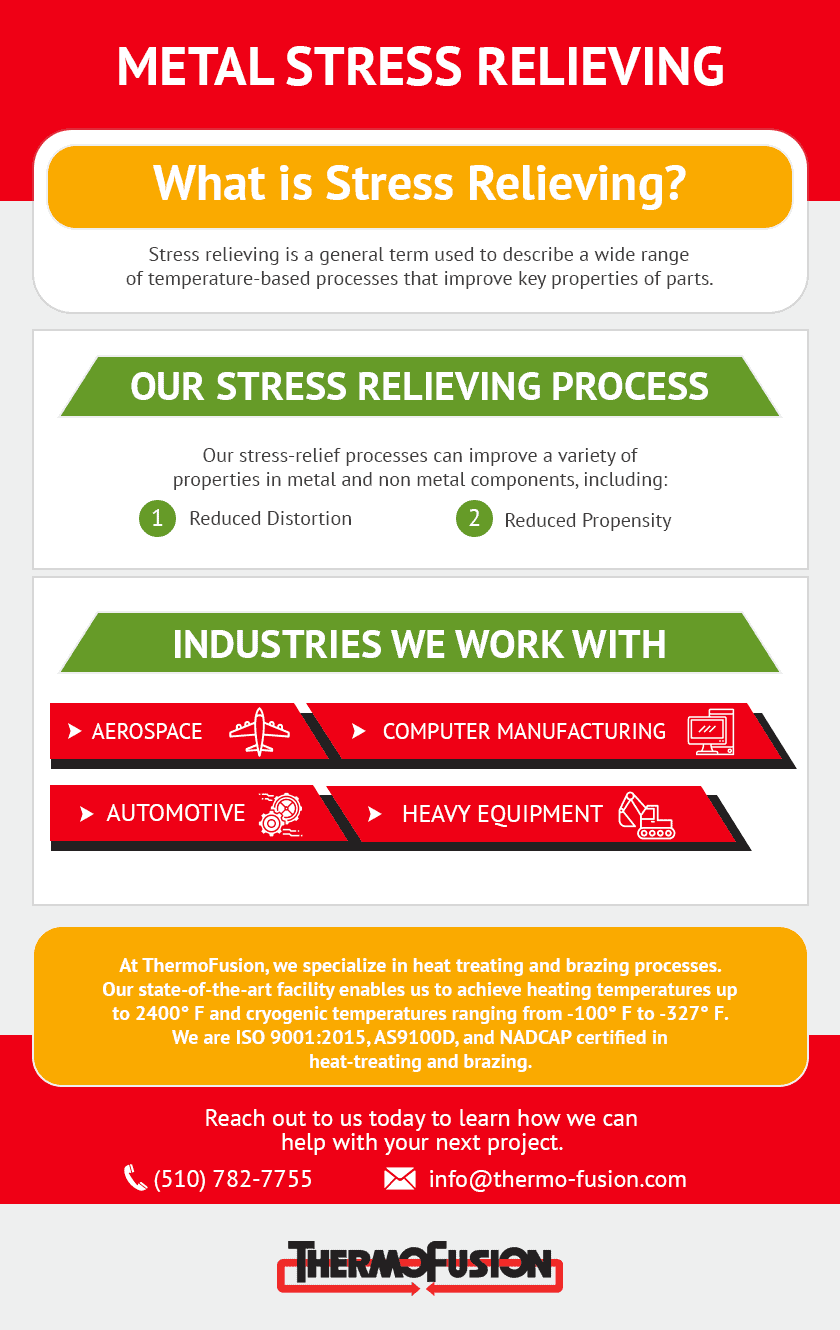 ThermoFusion is the only combined heat treating and brazing company in the Bay Area. We offer an extensive selection of heat (and cold) based services. One of our core service offerings is stress relieving.
ThermoFusion is the only combined heat treating and brazing company in the Bay Area. We offer an extensive selection of heat (and cold) based services. One of our core service offerings is stress relieving.
Stress relieving is a heat treatment process that involves heating the part to a specific temperature below its annealing temperature and then cooling it. It is used to reduce internal stresses in components generated during manufacturing operations (e.g., cutting (flame or laser), forming, machining, rolling, or straightening). It is often done before final machining. Proactively removing these stresses reduces the risk of distortion, cracking, and other damage occurring in the piece either during final machining, or over time. For this reason, it is often used for parts and products with tight dimensional tolerances, extensive machining requirements, and/or large and complex designs.
Stress Relieving Capabilities at ThermoFusion
Like stress relieving, annealing is used to diminish or eliminate internal stresses in formed, machined, rolled, and similarly processed components. However, the temperatures utilized in stress relieving operations are much lower than those used in annealing operations. Equipped with air, endothermic, and vacuum furnaces, our team can achieve the temperatures needed for both annealing and stress relieving treatment processes (600° F to 1,400° F). While we offer these services for all types of metal and plastic, our most commonly processed materials are aluminum, titanium, steel, and plastic.
Considerations for Stress Relieving Operations
There are many factors to consider when deciding whether stress relieving treatments are necessary for a manufactured component. Some of the considerations to keep in mind include:
- What is the material composition of the workpiece? The temperature utilized during stress relieving operations and the amount of time the temperature is held depends on the workpiece material. For example, these materials commonly require the following temperatures:
- Plastics | 200° F
- Aluminum | 350F
- Copper Alloys | 900° F
- Carbon Steels & Nickel Steels | 1,100° F
- High-alloy Steels | 1350° F
- What is the shape and state of the workpiece? Some components, such as cast materials with low ductility or geometries with stress risers, are prone to distortion or cracking during the heating phase of the stress relief process. For these products, it is necessary to slowly increase the temperature within the furnace until it reaches the proper stress relieving temperature.
- What equipment is being used for the operation? For parts and products where a high-quality surface finish is critical, vacuum furnaces are more appropriate since they minimize the risk of oxidation. While ThermoFusion almost exclusively performs stress relief in air furnaces, Nitrogen atmospheres also have a similar effect.
- What is the budget for the component? While the cost of stress relieving varies from component to component, this is a relatively inexpensive method to help ensure a good part at final machining. It is important to discuss budgetary constraints with the service provider before placing the order.
For steels, it is especially important to keep temperatures below the point at which austenitization occurs. The cooling time needed may also be influenced by the material. Some materials, such as high-carbon steels, are prone to surface cracking if cooling occurs too quickly.

Contact the Heat Treating Experts at ThermoFusion Today
ThermoFusion, Inc. is a leading provider of heat-treating services for components made from various materials and for a wide range of industries and industrial applications. Equipped with over 50 years of industry experience and numerous certifications (including ISO 9001:2015, AS9100D, and Nadcap), our team has what it takes to offer quick and efficient solutions for metallurgical challenges.
Contact Us today to learn more about our stress relieving capabilities and how they can benefit your components.
Top

